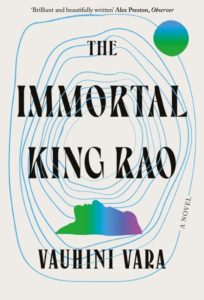
The Immortal King Rao
By Vauhini Vara
384 pages
Published May 3, 2022 by W.W. Norton & Co.
The Immortal King Rao was The Mules’ book for June. The overriding conclusion was that nobody liked it. And absolutely nobody would recommend it to others. I was in Greece, so I couldn’t attend in person. But I sent in my comments:
“Glad to hear the results – that you all disliked it. I found it to be tedious and lacking any intellectual or literary merit.
“I read To Have and Have Not again this week. God, what a difference! I was reminded of Hemingway’s advice to wannabe writers: ‘All you have to do is write one true sentence. Write the truest sentence you know, and then go on from there.’
“I found no such sentences in The Immortal King Rao. In fact, I can’t recall a single worthy idea, natural action, or believable emotion in the entire book. Nothing that felt true to me. Like The Maid, [LINK TO 2/25]]this is fiction that is all pretense. That can only exist in the imagination of someone that has the luxury of spending her reading time on fantasy.”
The Plot
In an Indian village in the 1950s, a precocious child is born into a family of Dalits. (See “Interesting,” below.) King Rao will grow up to be the most accomplished tech CEO in the world and, eventually, the leader of a global, mega-corporation-led government.
With climate change raging, he raises his daughter, Athena, in secret (having injected her with genetic code that allows her to access the entire internet and also all his memories). After his death, she finds herself in prison, awaiting judgment by algorithm for a crime she insists she did not commit. While she waits, she writes a lengthy self-defense addressed to the shareholders of the mega-corporation.
Interesting: The Dalits
The Dalits (a.k.a. “untouchables”) are outcasts, members of the lowest social group in the Hindu caste system. It’s the name that members of the group gave themselves in the 1930s. (The word “dalit” means oppressed or broken.) Traditionally, they performed spiritually contaminating work that nobody else wanted to do – in particular, anything involving death.
Critical Reception
The book was almost universally praised. Why? I have no idea. A few examples:
* “The Immortal King Rao is a monumental achievement: beautiful and brilliant, heartbreaking and wise, but also pitiless, which may be controversial to list among its virtues but is in fact essential to its success.” (Justin Taylor, The New York Times)
* “An exacting writer of the digital age, Vara makes her debut with a trippy novel that marries the family saga with a biotech satire.” (Jessica Jacolbe, Vulture)
* “A brilliant and beautifully written book about capitalism and the patriarchy, about Dalit India and digital America, about family and love.” (Alex Preston, The Observer)
About Vauhini Vara

From a Dalit background, Vauhini Vara is a Canadian-born American journalist, fiction writer, and the former business editor of The New Yorker. She was a reporter for The Wall Street Journal for almost ten years, where she covered Silicon Valley and California politics. A recipient of the O. Henry Award for her fiction, she studied writing at Stanford University and the Iowa Writers Workshop. The Immortal King Rao is her first novel.
 MarkFord
MarkFord